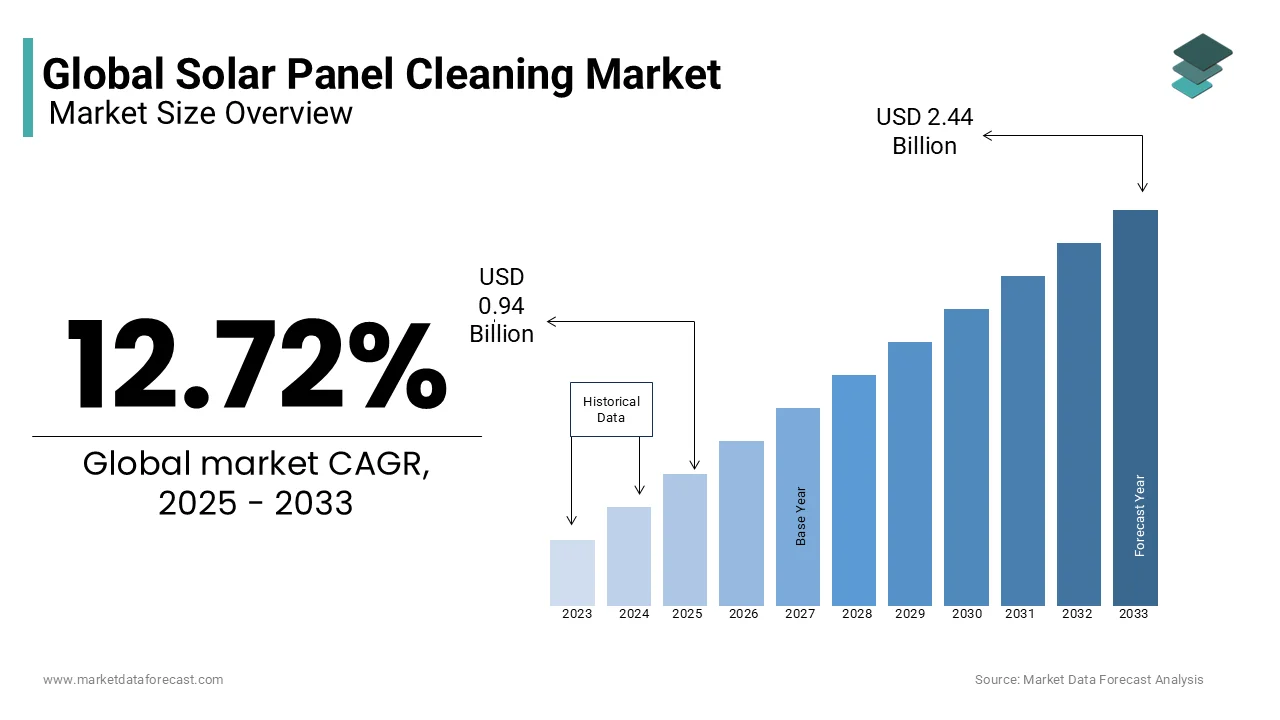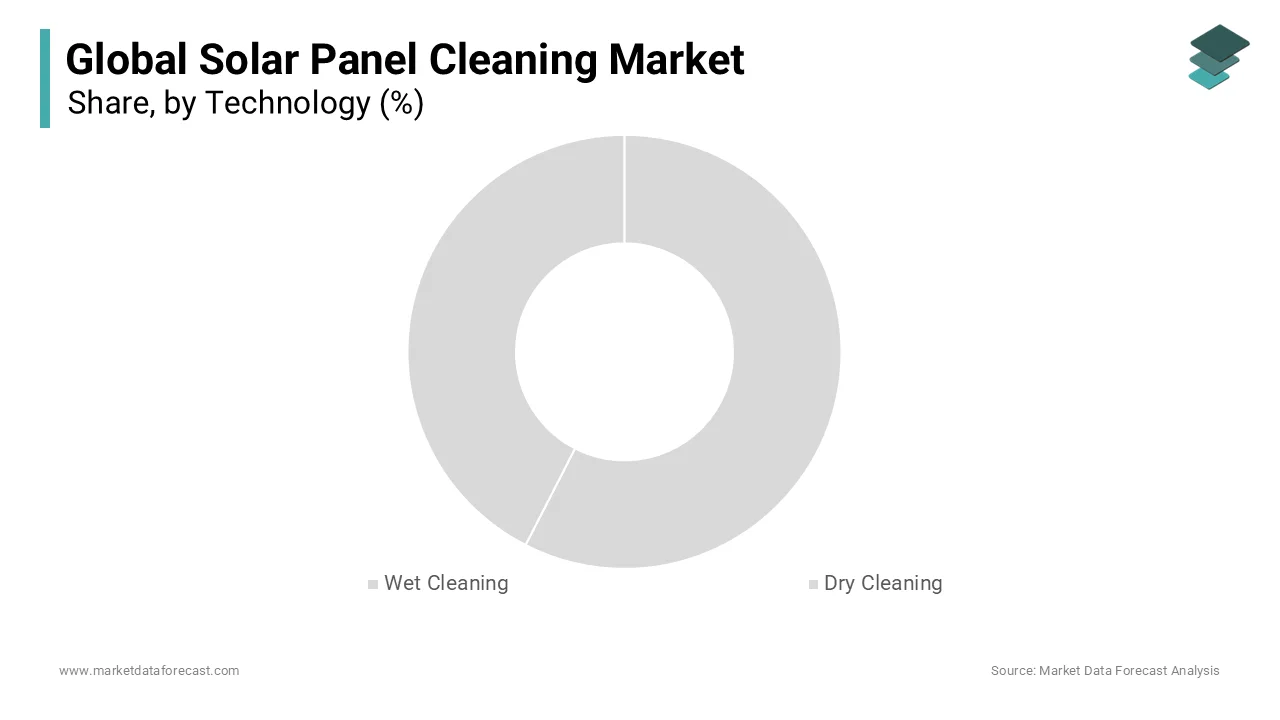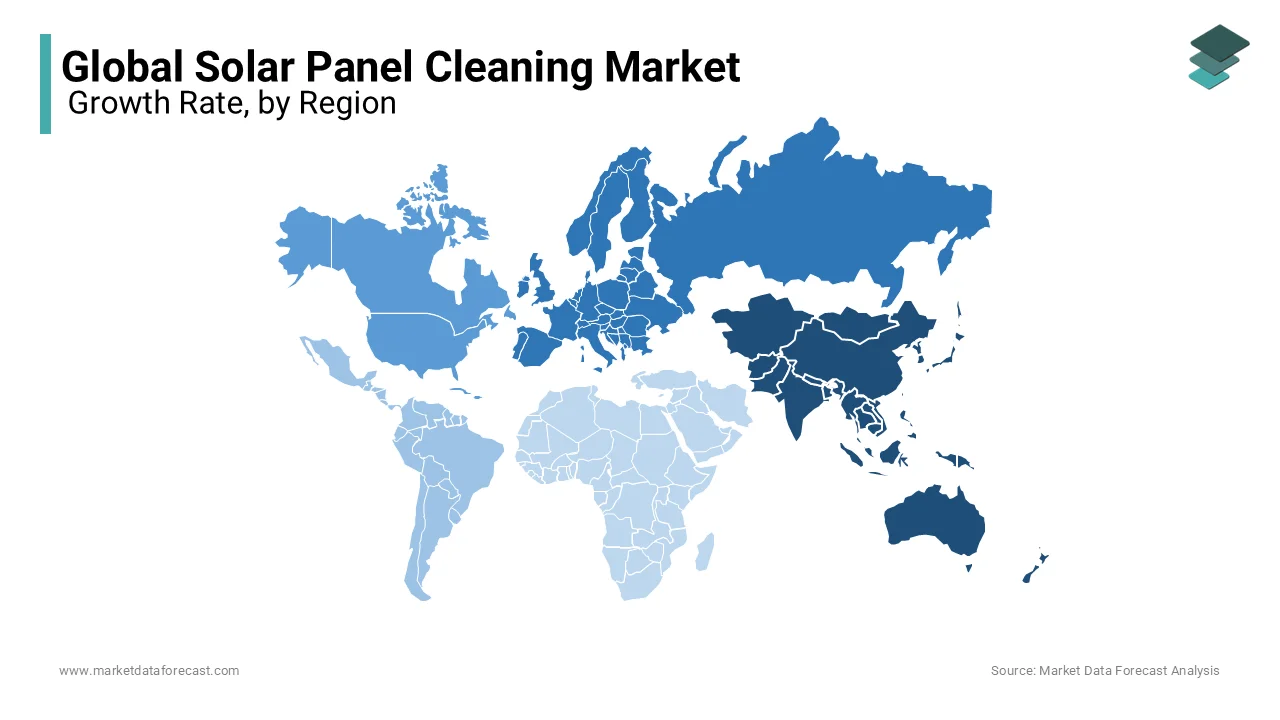Global Solar Panel Cleaning Market Size, Share, Trends & Growth Forecast Report By Technology (Wet cleaning (Automated, Water brushes and Semi-Automated) and Dry Cleaning (Electrostatic and Automated Robotic)), Process (Automated, Semi-Automated, Water Brushes, Automated Robotic, and Electrostatic), Mode of Operation, Application & Region (North America, Europe, Asia Pacific, Latin America, and Middle East & Africa), Industry Analysis From 2024 to 2033
Global Solar Panel Cleaning Market Size
The size of the global solar panel cleaning market was worth USD 0.83 billion in 2024. The global market is estimated to reach USD 2.44 billion by 2033 from USD 0.94 billion in 2025, growing at a CAGR of 12.72% from 2025 to 2033.

A solar panel, also termed a photovoltaic solar panel, is a device that gathers energy from the sun and converts it into electricity. It is made up of many solar cells. It is necessary to clean the solar panel for it to perform properly. Solar panel cleaning is the process or method of removing materials such as ashes, dust, bird droppings, and other contaminants from the panel surface. The collected particles function as a barrier between the panel and the sunlight. The panels must be cleaned to retain their efficient output. Cleaning can be postponed in rainy locations, while cleaning is required in dry places. Solar panel cleaning is necessary for the commercial, industrial, and residential sectors.
MARKET DRIVERS
The growing installation of solar panels and the increasing initiatives of governments driving the growth
The growing installation of solar panels and the increasing initiatives of governments in several countries to promote solar energy are driving the growth of the solar panel cleaning market. The wet cleaning of solar panels is highly effective at cleaning panel surfaces and is low-cost and widely accessible, and this awareness among solar energy consumers is gradually increasing and contributing to the global market growth. Solar energy is becoming increasingly popular in developing countries. Several governments worldwide have taken numerous initiatives to boost the adoption of solar energy and increase the consumption of solar power, which are estimated to result in the increasing installations of solar panels and propelling the growth of the solar panel cleaning market. As a result, the frequency of solar panel cleaning has increased. This will fuel the solar panel cleaning market. In addition, many emerging economies are seeing an increase in demand for solar panels for power generation.
The rising awareness of dry cleaning solutions supports the global solar panel cleaning market. Dry solar panel cleaning solutions are being developed to help alleviate global water constraints, which is adding fuel to the growth rate of the global solar panel cleaning market. Furthermore, the utilization of clean energy and the conservation of other natural resources is becoming more popular, and many businesses are turning to solar energy, which propels the global solar panel cleaning market growth. Moreover, the global solar panel cleaning market will rise as a result of an increase in large-scale solar installations across numerous coastal and agricultural regions with heavy soil and dust buildup.
The wet segment is very efficient in cleaning panel surfaces and is low-cost and easily accessible, further driving the global solar panel cleaning market. Solar energy is becoming more popular in developing countries. In addition, the government has encouraged the use of solar energy, which has resulted in a surge in solar panels and cleaning, which will fuel the solar panel cleaning industry. Many emerging economies are seeing an increase in demand for solar panels for power generation, in which the global solar panel cleaning market will experience major growth. The need for solar panel cleaning will be boosted by increased awareness about the use of clean energy, the protection of natural resources, and the adoption of solar energy by many businesses. In addition, the market will rise due to increased large-scale solar installations across numerous coastal and agricultural regions with heavy dust and soil deposition.
MARKET RESTRAINTS
Industrial and commercial Solar panel cleaning systems are difficult to implement
Industrial and commercial Solar panel cleaning systems are difficult to implement since water and energy sources are rarely available near the solar panels. Because they may be on rooftops, carports, or off the ground, cleaning them might be risky. Because solar panel installers do not consider cleaning while designing the arrangement, each installation is unique. A large number of people entails a large amount of risk. With this cleaning system, there will be more accidents. With this approach, water consumption is substantially higher. An investment of USD 20,000 – $50,000 is required. Operators must be trained, and the robots might be large and heavy, necessitating the use of two to three operators. Inclination levels may be a problem. Therefore, these factors tend to hamper the global solar panel cleaning market growth during 2024-2032.
REPORT COVERAGE
|
REPORT METRIC |
DETAILS |
|
Market Size Available |
2024 to 2033 |
|
Base Year |
2024 |
|
Forecast Period |
2025 to 2033 |
|
CAGR |
12.72% |
|
Segments Covered |
By Technology, Process, Mode of Operation, Application, and Region. |
|
Various Analyses Covered |
Global, Regional and Country Level Analysis; Segment-Level Analysis; DROC, PESTLE Analysis; Porter’s Five Forces Analysis; Competitive Landscape; Analyst Overview of Investment Opportunities |
|
Regions Covered |
North America, Europe, APAC, Latin America, Middle East & Africa |
|
Market Leaders Profiled |
Boson Robotics Ltd., Ecoppia, Karcher, Kashgar Solbright Photovoltaic Technology Co., Ltd., NOMADD, Premier Solar Cleaning, LLC, Saint-Gobain Surface Conditioning, Serbot AG, Sharp Corporation, SunBrush Mobil GmbH, and Others. |
SEGMENTAL ANALYSIS
By Technology Insights
The wet cleaning segment is anticipated to hold the largest global solar panel cleaning market share in the next six years. Because of its high effectiveness in cleaning panel surfaces and wide applicability and practicality across a wide range of soiling situations, the wet segment of the solar panel cleaning market is expected to increase significantly. Furthermore, the availability of organic compounds as a replacement for water-based cleaning processes will aid product acceptance. Furthermore, low unit cost, great reliability, and ease of access are some of the key attributes that will drive product demand.

By Process Insights
The automated segment is predicted to dominate the global solar panel cleaning market share during the forecast period. It works in a unique way since it uses several brush modifications to help clean some hard-to-reach areas in the panels more easily. Manufacturers are constantly researching and developing new technologies to improve the entire experience of solar farm owners by delivering personalized and flexible cleaning solutions.
By Mode of Operation Insights
According to the mode of operation, demand for autonomous solar panel cleaning will continue to expand in the future years. This is due to the exponential growth of current technologies such as remote sensing, machine learning, and remote management. In addition, there are various advantages to operating solar panels in autonomous mode, including better ease of use and lower setup costs, which will attract a huge number of users to do so.
By Application Insights
The commercial application segment is expected to propel the global solar panel cleaning market forward. Industrial facilities in off-grid or remote regions can benefit from commercial solar panels. For example, signs and message boards can be illuminated using commercial solar panels mounted on building rooftops. Solar energy charges the battery, allowing the signs to be illuminated at all hours of the day and night, which further accelerates the market growth.
REGIONAL ANALYSIS
The Asia-Pacific region dominated the solar panel cleaning market by accounting for 42.7% of the worldwide market share in 2024, and the Asia-Pacific region is anticipated to continue to lead the global market throughout the forecast period. It is a proven fact that regular cleaning of solar panels can improve their efficiency considerably. The rapid adoption of solar energy, the increasing number of solar energy initiatives from the governments of Asia-Pacific countries and the presence of major solar markets such as China and India have majorly contributed to the domination of the Asia-Pacific region in the worldwide market and the impact of these factors is likely to continue during the forecast period and support the regional market growth. As per the data of the National Energy Administration, China installed 45.74 GW of new solar power capacity in Q1 2024.

Europe was the second biggest regional segment for solar panel cleaning in the global market in 2023 and accounted for a substantial share of the worldwide market. The European market is expected to grow at a healthy CAGR during the forecast period. The growing support from the governments of European countries for renewable energy, high installation rates of solar panels and stringent maintenance regulations are majorly propelling the growth of the European market. For instance, as per SolarPower Europe, the EU solar fleet was increased from 207 GW in 2022 to 263 GW in 2023. Furthermore, an increasing number of solar farms and advancements in cleaning technologies are contributing to the expansion of the European market. Germany is currently playing the leading role in the European market and is expected to play an integral role in the European market throughout the forecast period. According to the data of the German Federal Network Agency Bundesnetzagentur, the solar capacity in Germany grew from 7.45 GW in 2022 to 14.2 GW, which was a 91% increase.
North America accounted for a considerable share of the worldwide market in 2023 and is estimated to grow at a notable CAGR during the forecast period. The growing adoption of solar energy, favorable government incentives, and increasing awareness about efficiency losses due to dirty panels are some of the major factors that are propelling the solar panel cleaning market in North America. Technological advancements and the presence of large-scale solar farms are further fuelling the growth rate of the North American market. The U.S., followed by Canada, is leading the market in North America.
KEY MARKET PARTICIPANTS
Companies playing a prominent role in the global solar panel cleaning market include Boson Robotics Ltd., Ecoppia, Karcher, Kashgar Solbright Photovoltaic Technology Co., Ltd., NOMADD, Premier Solar Cleaning, LLC, Saint-Gobain Surface Conditioning, Serbot AG, Sharp Corporation, SunBrush mobil GmbH.
RECENT HAPPENINGS IN THE MARKET
- In July 2022, Ecoppia, one of the key players in the solar panel cleaning market, won the Top Product of the Year Award for their H4 robot in the elite Environment + Energy Leader Awards program.
- Ecoppia announced that it would produce robotic solar cleaning tech in India and further added that it was delightful to become a success story for Israel by introducing leading technology in solar cleaning robotics.
MARKET SEGMENTATION
This research report on the global solar panel cleaning market has been segmented and sub-segmented based on technology, process, mode of operation, application, and region.
By Technology
- Wet Cleaning
- Automated
- Water Brushes
- Semi-Automated
- Dry Cleaning
- Electrostatic
- Automated Robotic
By Process
- Automated
- Semi-Automated
- Water Brushes
- Automated Robotic
- Electrostatic
By Mode of Operation
- Autonomous
- Manual
By Application
- Commercial
- Residential
- Industrial
- Utility
By Region
- North America
- Europe
- Asia Pacific
- Latin America
- Middle East & Africa
Frequently Asked Questions
How does climate affect the demand for solar panel cleaning services?
Regions prone to high dust levels (e.g., deserts in the Middle East), heavy rain (causing dirt streaking), or snow accumulation see higher demand for cleaning services to maintain energy generation.
What challenges does the solar panel cleaning market face?
Key challenges include high initial costs for automated cleaning solutions, water scarcity in arid regions, and damage risks to solar panels during cleaning.
Are waterless cleaning technologies gaining traction globally?
Yes, waterless cleaning, using brushes, air pressure, or electrostatic cleaning, is gaining popularity in water-scarce regions. These solutions also reduce the environmental footprint of cleaning operations.
What are the environmental benefits of automated solar panel cleaning?
Automated cleaning systems optimize water usage, minimize chemical reliance, and reduce the carbon footprint associated with maintenance, aligning with global sustainability goals.
Related Reports
Access the study in MULTIPLE FORMATS
Purchase options starting from $ 2500
Didn’t find what you’re looking for?
TALK TO OUR ANALYST TEAM
Need something within your budget?
NO WORRIES! WE GOT YOU COVERED!
Call us on: +1 888 702 9696 (U.S Toll Free)
Write to us: [email protected]